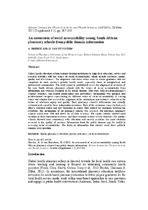| dc.contributor.author | Bheekie, Angeni | |
| dc.contributor.author | Van Huyssteen, Mea | |
| dc.date.accessioned | 2018-08-07T06:47:39Z | |
| dc.date.available | 2018-08-07T06:47:39Z | |
| dc.date.issued | 2017 | |
| dc.identifier.citation | Bheekie, A. & Van Huyssteen, M. (2017). An assessment of social accountability among South African pharmacy schools from public domain information. African Journal for Physical Activity and Health Sciences (AJPHES), 2017(suppl1-2): 317 - 334 | en_US |
| dc.identifier.issn | 2411-6939 | |
| dc.identifier.uri | http://hdl.handle.net/10520/EJC-c26a27aec | |
| dc.identifier.uri | http://hdl.handle.net/10566/3935 | |
| dc.description.abstract | Global health education reform requires training institutions to align their education, service and
research activities with the values of social accountability, which include relevance, equity,
quality and effectiveness. The alignment with these values aims to ensure graduates who are
competent to meet society’s priority health needs, especially those of marginalised and
underserved communities. This study aimed to qualitatively assess the alignment of activities of
the nine South African pharmacy schools with the values of social accountability from
information and evidence available in the public domain. Data were collected from pharmacy
schools’ websites, and related publications and newsletters. Information was grouped into
predetermined categories representing the different values of social accountability. A scoring
rubric was adapted that assessed the alignment of the information and evidence collected to the
values of relevance equity and quality. Each pharmacy school’s information was initially
reviewed and scored by three independent reviewers. Each of the reviewers cross-checked each
other’s allocated scores and any variations in scores were settled via consensus between the
reviewers. The information of six pharmacy schools was assessed. For relevance, pharmacy
schools scored over 50% and above for all their activities. For equity, schools showed most
variation in their educational activities, and least variation in their service activities. For quality,
schools showed most consistency with education and service activities but most variation
occurred in the quality of services. Information from the public domain may be useful in
assessing social accountability. The depth of information that schools could share publicly
remains a key question. | en_US |
| dc.language.iso | en | en_US |
| dc.publisher | AFAHPER-SD | en_US |
| dc.rights | Permission is hereby granted to put article on the repository | |
| dc.subject | Equity | en_US |
| dc.subject | Pharmacy education | en_US |
| dc.subject | Quality | en_US |
| dc.subject | Relevance | en_US |
| dc.subject | Social accountability | en_US |
| dc.title | An assessment of social accountability among South African pharmacy schools from public domain information | en_US |
| dc.type | Article | en_US |
| dc.privacy.showsubmitter | FALSE | |
| dc.status.ispeerreviewed | TRUE | |
| dc.description.accreditation | DHET | |

